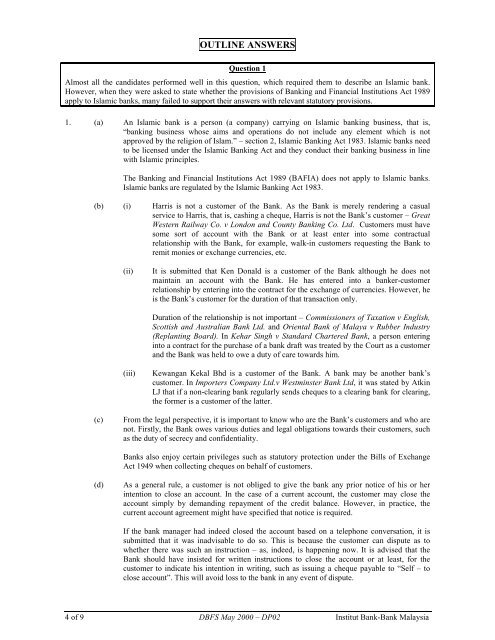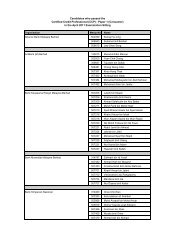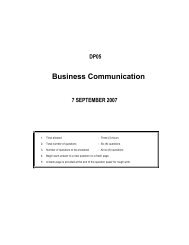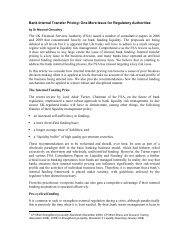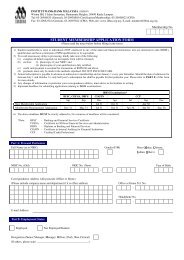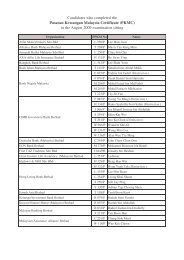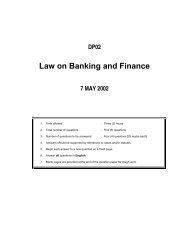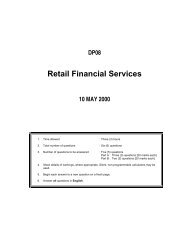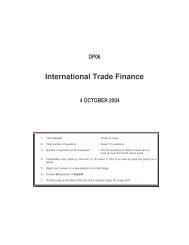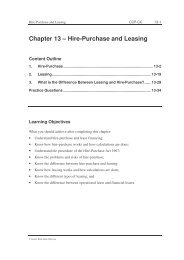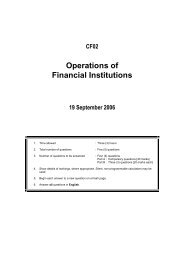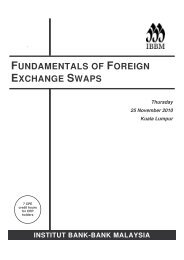Law on Banking and Finance - Institute of Bankers Malaysia
Law on Banking and Finance - Institute of Bankers Malaysia
Law on Banking and Finance - Institute of Bankers Malaysia
Create successful ePaper yourself
Turn your PDF publications into a flip-book with our unique Google optimized e-Paper software.
OUTLINE ANSWERS<br />
Questi<strong>on</strong> 1<br />
Almost all the c<strong>and</strong>idates performed well in this questi<strong>on</strong>, which required them to describe an Islamic bank.<br />
However, when they were asked to state whether the provisi<strong>on</strong>s <strong>of</strong> <strong>Banking</strong> <strong>and</strong> Financial Instituti<strong>on</strong>s Act 1989<br />
apply to Islamic banks, many failed to support their answers with relevant statutory provisi<strong>on</strong>s.<br />
1. (a) An Islamic bank is a pers<strong>on</strong> (a company) carrying <strong>on</strong> Islamic banking business, that is,<br />
“banking business whose aims <strong>and</strong> operati<strong>on</strong>s do not include any element which is not<br />
approved by the religi<strong>on</strong> <strong>of</strong> Islam.” – secti<strong>on</strong> 2, Islamic <strong>Banking</strong> Act 1983. Islamic banks need<br />
to be licensed under the Islamic <strong>Banking</strong> Act <strong>and</strong> they c<strong>on</strong>duct their banking business in line<br />
with Islamic principles.<br />
The <strong>Banking</strong> <strong>and</strong> Financial Instituti<strong>on</strong>s Act 1989 (BAFIA) does not apply to Islamic banks.<br />
Islamic banks are regulated by the Islamic <strong>Banking</strong> Act 1983.<br />
(b) (i) Harris is not a customer <strong>of</strong> the Bank. As the Bank is merely rendering a casual<br />
service to Harris, that is, cashing a cheque, Harris is not the Bank’s customer – Great<br />
Western Railway Co. v L<strong>on</strong>d<strong>on</strong> <strong>and</strong> County <strong>Banking</strong> Co. Ltd. Customers must have<br />
some sort <strong>of</strong> account with the Bank or at least enter into some c<strong>on</strong>tractual<br />
relati<strong>on</strong>ship with the Bank, for example, walk-in customers requesting the Bank to<br />
remit m<strong>on</strong>ies or exchange currencies, etc.<br />
(ii)<br />
It is submitted that Ken D<strong>on</strong>ald is a customer <strong>of</strong> the Bank although he does not<br />
maintain an account with the Bank. He has entered into a banker-customer<br />
relati<strong>on</strong>ship by entering into the c<strong>on</strong>tract for the exchange <strong>of</strong> currencies. However, he<br />
is the Bank’s customer for the durati<strong>on</strong> <strong>of</strong> that transacti<strong>on</strong> <strong>on</strong>ly.<br />
Durati<strong>on</strong> <strong>of</strong> the relati<strong>on</strong>ship is not important – Commissi<strong>on</strong>ers <strong>of</strong> Taxati<strong>on</strong> v English,<br />
Scottish <strong>and</strong> Australian Bank Ltd. <strong>and</strong> Oriental Bank <strong>of</strong> Malaya v Rubber Industry<br />
(Replanting Board). In Kehar Singh v St<strong>and</strong>ard Chartered Bank, a pers<strong>on</strong> entering<br />
into a c<strong>on</strong>tract for the purchase <strong>of</strong> a bank draft was treated by the Court as a customer<br />
<strong>and</strong> the Bank was held to owe a duty <strong>of</strong> care towards him.<br />
(iii)<br />
Kewangan Kekal Bhd is a customer <strong>of</strong> the Bank. A bank may be another bank’s<br />
customer. In Importers Company Ltd.v Westminster Bank Ltd, it was stated by Atkin<br />
LJ that if a n<strong>on</strong>-clearing bank regularly sends cheques to a clearing bank for clearing,<br />
the former is a customer <strong>of</strong> the latter.<br />
(c)<br />
From the legal perspective, it is important to know who are the Bank’s customers <strong>and</strong> who are<br />
not. Firstly, the Bank owes various duties <strong>and</strong> legal obligati<strong>on</strong>s towards their customers, such<br />
as the duty <strong>of</strong> secrecy <strong>and</strong> c<strong>on</strong>fidentiality.<br />
Banks also enjoy certain privileges such as statutory protecti<strong>on</strong> under the Bills <strong>of</strong> Exchange<br />
Act 1949 when collecting cheques <strong>on</strong> behalf <strong>of</strong> customers.<br />
(d)<br />
As a general rule, a customer is not obliged to give the bank any prior notice <strong>of</strong> his or her<br />
intenti<strong>on</strong> to close an account. In the case <strong>of</strong> a current account, the customer may close the<br />
account simply by dem<strong>and</strong>ing repayment <strong>of</strong> the credit balance. However, in practice, the<br />
current account agreement might have specified that notice is required.<br />
If the bank manager had indeed closed the account based <strong>on</strong> a teleph<strong>on</strong>e c<strong>on</strong>versati<strong>on</strong>, it is<br />
submitted that it was inadvisable to do so. This is because the customer can dispute as to<br />
whether there was such an instructi<strong>on</strong> – as, indeed, is happening now. It is advised that the<br />
Bank should have insisted for written instructi<strong>on</strong>s to close the account or at least, for the<br />
customer to indicate his intenti<strong>on</strong> in writing, such as issuing a cheque payable to “Self – to<br />
close account”. This will avoid loss to the bank in any event <strong>of</strong> dispute.<br />
4 <strong>of</strong> 9 DBFS May 2000 – DP02 Institut Bank-Bank <strong>Malaysia</strong>


